The MTSU College of Education’s undergraduate elementary teacher preparation program was recently ranked among the nation’s best by the National Council on Teacher Quality.
Despite the onset of COVID, the college continues its dedication to providing the same high-quality preparation to its students with hands-on, practical experience in real classrooms.
Everything changed in March, recalled Bobbi Lussier, executive director of professional laboratory experiences at the college.
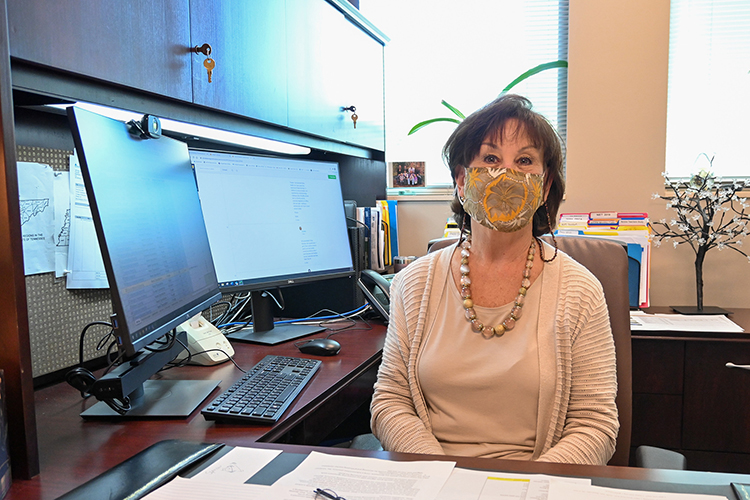
Bobbi Lussier, executive director of professional laboratory experiences at the MTSU’s College of Education, works in her office on campus on Oct. 15, 2020. (MTSU photo by Stephanie Barrette)
“They (teacher candidates or student teachers) were able to submit their Education Teacher Performance Assessments, but they did not start their second placement,” Lussier said. “The second placement never happened. The world stopped. COVID took over.”
Faculty quickly provided students with specialized resources to replace the cancelled field placements. One resource was a video library called Accomplished Teaching, Learning and Schools or ATLAS.
“We used ATLAS,” Lussier said. “It’s incredible. It’s a video library of National Board Certified teachers, and it’s aligned to the edTPA, a teacher performance assessment. It actually is examples of superior work for our students to view. They would watch videos based on subject and grade-level instruction, and they would respond to questions regarding the lesson.”
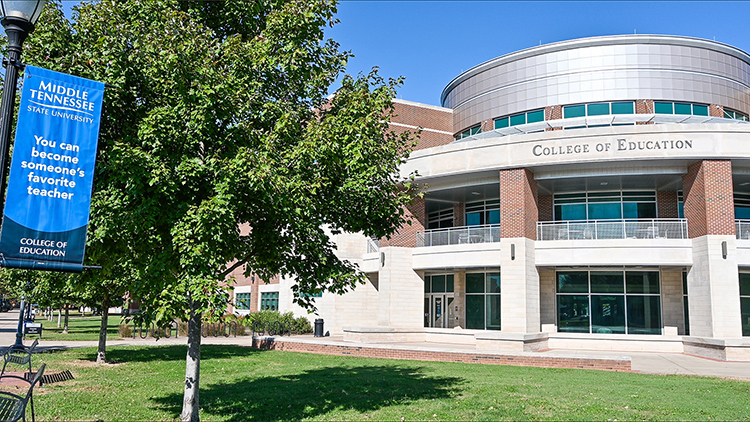
MTSU’s College of Education shines in the sunlight on a fall day on campus on Oct. 15, 2020. (MTSU photo by Stephanie Barrette)
“It was really a good way for our (college) students to stay engaged, learn and improve their instructional skills,” Lussier added. “It wasn’t the same as getting to see them (students in the classroom), but no one was ready for what happened last spring.”
The college’s strong partnerships with surrounding school districts made student teaching this fall possible.
“We were very fortunate, extremely fortunate,” Lussier explained, about MTSU’s partnerships with Rutherford County Schools and Murfreesboro City Schools. “They welcomed us with open arms. … No one has said no to us for (any of) the practicum hours.”
Student teachers adopted the COVID-policy employed by their mentor teacher and designated school. Some teach virtually, some follow a hybrid protocol and others are traditional or 100% in-person.
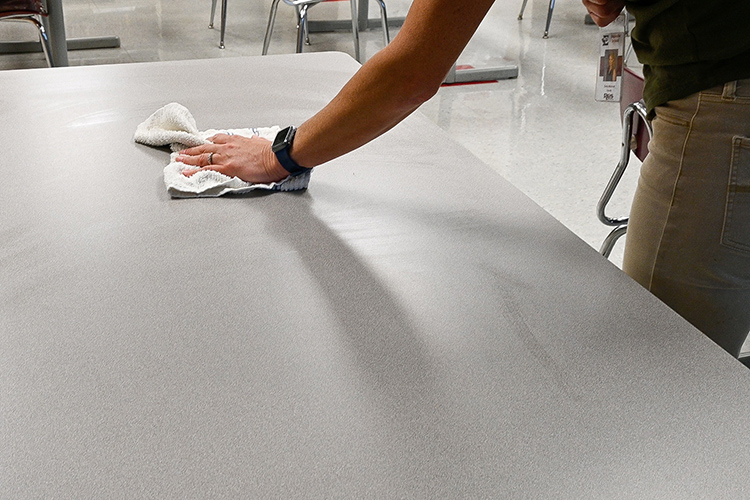
Agriculture teacher Emily Marshall sanitizes the tables in her classroom between classes at Eagleville High School in Eagleville, Tenn., on Oct. 14, 2020. (MTSU photo by Stephanie Barrette)
Lussier and the faculty also adapted aspects of the teacher preparation program to better suit COVID restrictions.
To decrease disruption for student teachers, school districts and students, the college decided on only one student teaching placement in the semester instead of two.
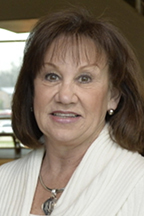
Bobbi Lussier
“We most likely will continue with one placement in the spring simply because of the different modalities of instruction,” Lussier said. “One placement lessens the pressure.” It also provides a better opportunity for student teachers to develop relationships with the students and the school, she said.
Field placement hours extend beyond the final semester of student teaching. Education students participate in several hands-on, in-the-classroom placements throughout their years of study.
Because of its partnerships with local school districts, MTSU has maintained all practicum hours this semester. Other universities have not been able to do so.
“As I have talked with other universities,” Lussier said, “what I kept hearing was, ‘Well they took our student teachers, but they won’t take anyone else.’”
The college also modified its three seminars for student teachers. Two seminars were split into two separate sessions to cut the number of attendees in half. The final seminar, scheduled in December after the university closes at Thanksgiving, will take place virtually.
Current student teachers
Three current teacher candidates shared their experience of student teaching during the COVID pandemic.
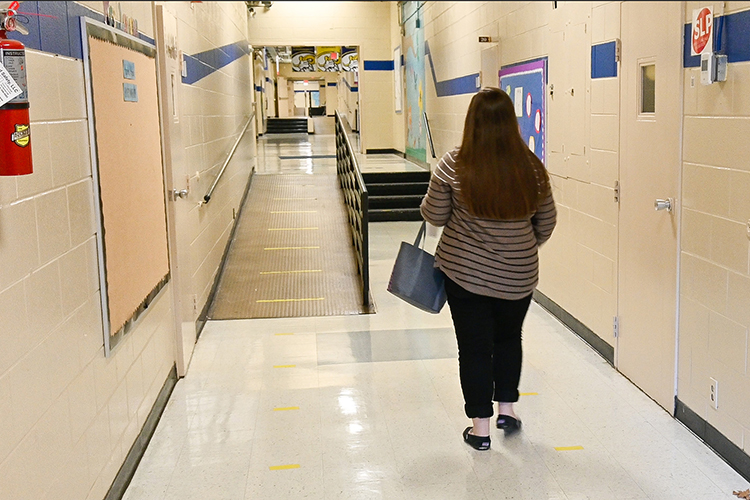
Elizabeth Smith, an MTSU teacher candidate student, walks the empty halls of Thurman Francis Arts Academy while completing her semester of student teaching during COVID in Smyrna, Tenn., on Oct. 14, 2020. (MTSU photo by Stephanie Barrette)
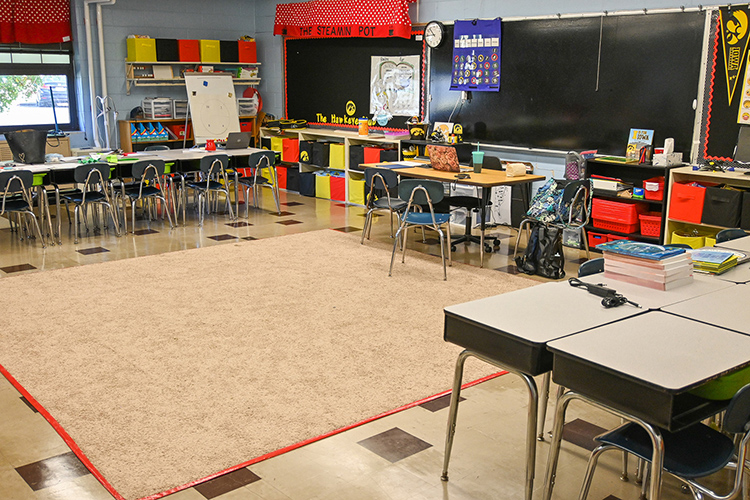
With students learning virtually from home, this first-grade classroom at Thurman Francis Arts Academy sits empty in Smyrna, Tenn., on Oct. 14, 2020. (MTSU photo by Stephanie Barrette)

Elizabeth Smith
“MTSU could not have planned for COVID,” said Elizabeth Smith, an early childhood education student. “No one could have. I’m sure they had to rely a lot on finding out what the districts were doing, if they would even allow us to still come in.”
Smith has enjoyed spending the full semester student teaching in the same, fully virtual, first-grade classroom at Thurman Francis Arts Academy in Smyrna, Tennessee.
“I like that better. I’m able to build relationships with the school more,” she said. “It really opens me up to meeting other people (in the school). I have met so many different people that are so amazing at things that I struggle with.”
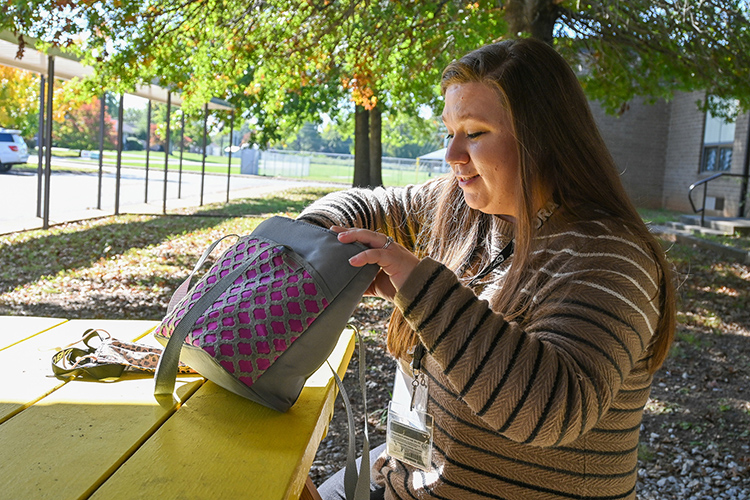
Elizabeth Smith, an MTSU teacher candidate student, enjoys lunch outside of Thurman Francis Arts Academy in Smyrna, Tenn., on Oct. 14, 2020. (MTSU photo by Stephanie Barrette)
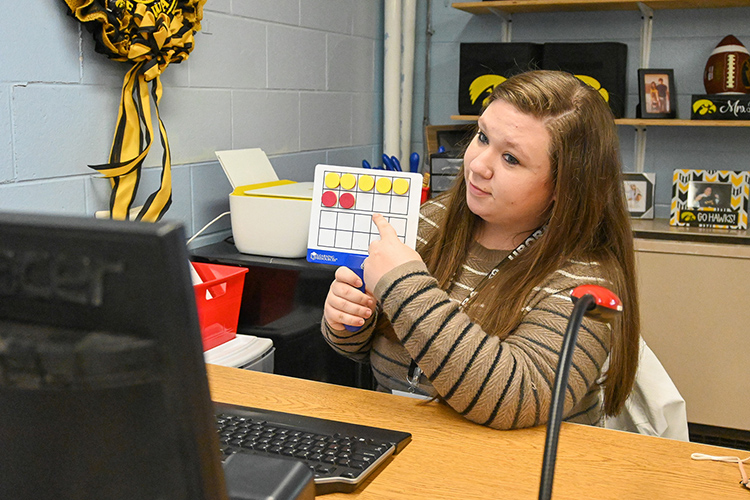
MTSU teacher candidate student Elizabeth Smith teaches her first-grade class virtually at Thurman Francis Arts Academy in Smyrna, Tenn., on Oct. 14, 2020. (MTSU photo by Stephanie Barrette)
She does not regret that her placement is virtual rather than in-person.
“I would not say that teaching virtually has been a disadvantage.… I’m honestly really thankful that I’m not a first-year teacher out there trying to figure it out on my own. I’m figuring it out with someone who has 20 years of experience. I bring the technology side, she brings her 20 years of experience and we make education happen.”
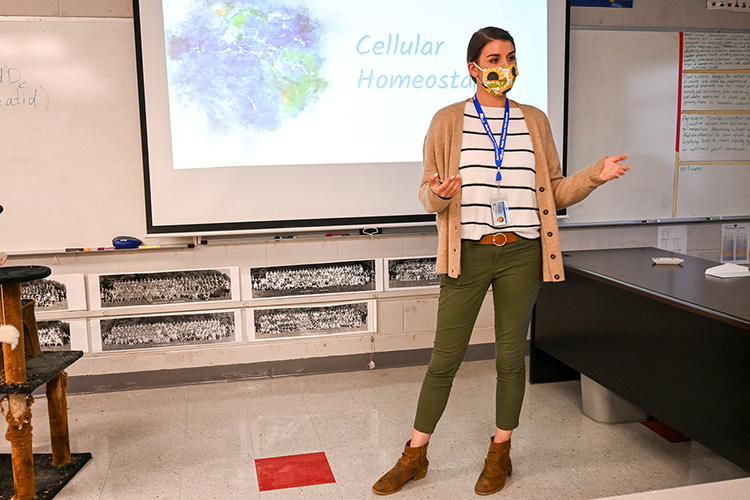
Sarah Martin, an MTSU teacher candidate, teaches a lesson on homeostasis during her student teaching placement at Eagleville High School in Eagleville, Tenn., on Oct. 14, 2020. (MTSU photo by Stephanie Barrette)
“This semester has been a lot of learning more than anything,” said Sarah Martin, an agribusiness student with a minor in secondary education. She completed her student teaching placement completely in-person in a veterinary science class at Eagleville High School.
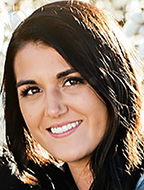
Sarah Martin
Martin is grateful that, despite COVID, she had a final semester of student teaching in the classroom.
“They (faculty) went through a really hard time to find us our placements,” she said. Martin did not find out her placement information until August, which is later than usual. “The fact that they made it happen is, I think, extraordinary.”
She also appreciates the support of her professors during this unprecedented time.
“The way that they have really wrapped their arms around us as students,” she said. “They have shown so much love and so much support to us…. They really do care…. They have done just an amazing job.”
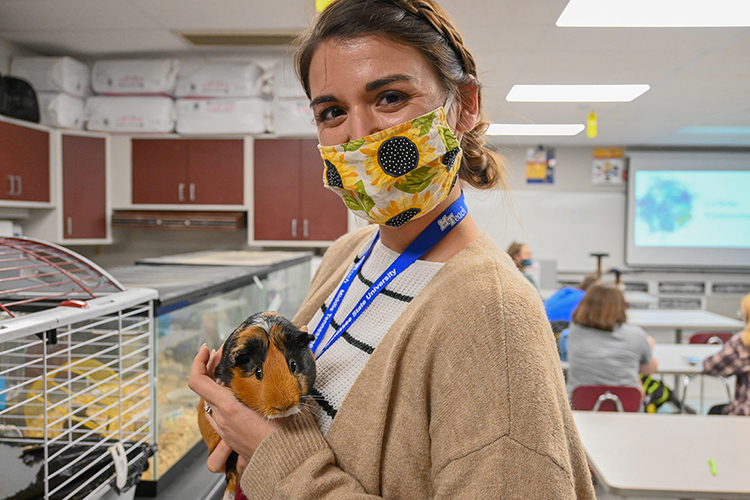
MTSU teacher candidate student Sarah Martin shows off a guinea pig at Eagleville High School in Eagleville, Tenn., on Oct. 14, 2020. (MTSU photo by Stephanie Barrette)
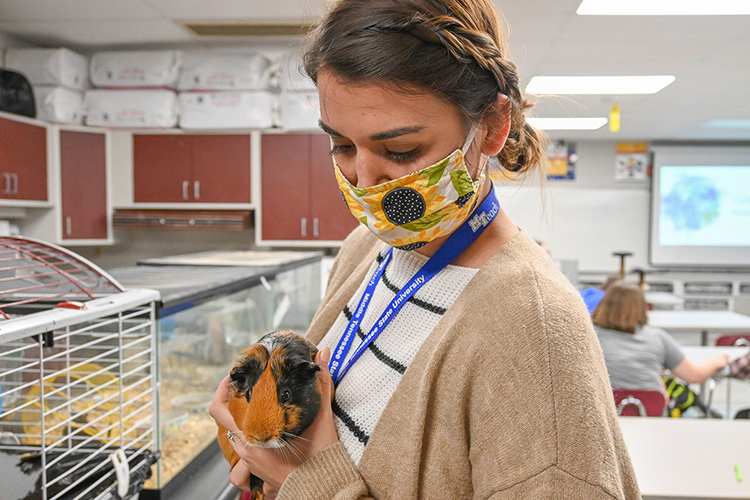
Sarah Martin, an MTSU teacher candidate student, works with a guinea pig during her student teaching semester at Eagleville High School in Eagleville, Tenn., on Oct. 14, 2020. (MTSU photo by Stephanie Barrette)
Martin got creative to include partner work for her students while following social distancing rules. Students used Google Docs and Slides to share work with each other online. Two students could work on the same project simultaneously, even chatting to each other through the program.
“They had the chat box in Google Docs that they could sit there and talk,” Martin said. “They’re not screaming across the room at each other. It went really well.”
Bennie Davis, a graduate student, taught a first-grade class at Overall Creek. The class is a hybrid of online and in-person students, but all students returned to the classroom by mid-semester.
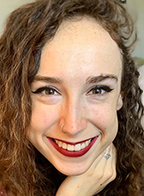
Bennie Davis
“They have been huge troopers,” Davis said.
Though she and her mentor teacher have to remind students to keep their masks from sliding down their noses, mask-wearing has not been a big problem.
“Thankfully we haven’t really had a problem with students wanting to take off their masks or playing with them, twirling them around,” she said.
“We had to remove things like the carpet that was usually at the center of the room,” Davis continued. “We can’t do a whole lot of group work, so we do a lot of partner work with the (two) kids that are at the tables (together).”
Lussier knew that Residency II (the semester of student teaching) teacher candidates and all education students had to get back into classrooms this fall.
“We know that we have an ethical and a moral obligation to support our future teachers because it’s not just about them,” Lussier said. “It’s about all the children that they’re going to touch when they get out into the classroom. It’s affecting communities. It’s affecting lives. We need it to be the best program that it can possibly be, and we weren’t going to relent on the quality of the program or the services that we can provide the students.”
To find out more about the opportunities at the College of Education, visit the website.
— Stephanie Barrette (Stephanie.Barrette@mtsu.edu)

COMMENTS ARE OFF THIS POST